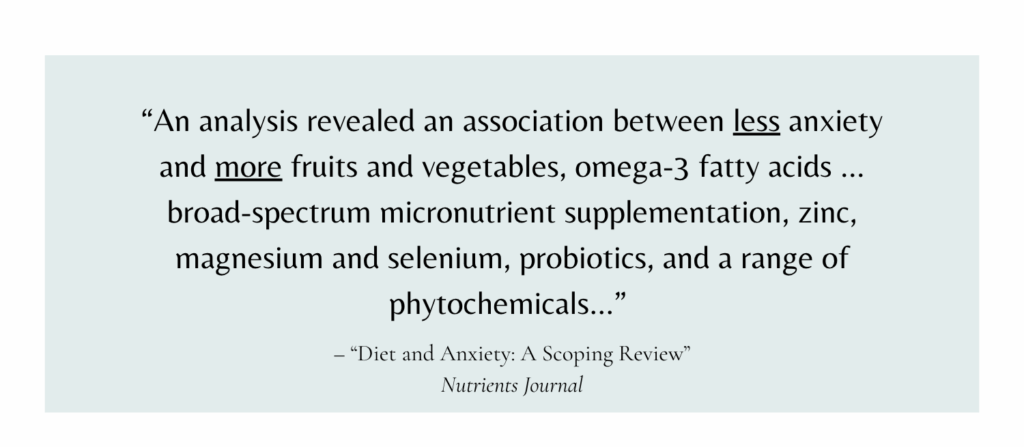Authored by Carolne Morin, NBC-HWC
On a typical morning, Laura grabbed a muffin and a coffee before rushing out the door. As a busy real estate agent, her days were packed with client meetings and showings, leaving little time for a proper lunch. By the time she picked up her kids from school and started dinner, she was starving, irritable and on edge. From the outside, Laura looked like she had it all together. Inside, though, she was drowning in anxiety.
Her story is more common than we realize.
What is anxiety?
In the United States, about 1 in 5 adults experience anxiety disorder. Women are twice as likely as men to struggle with anxiety, partly because anxiety symptoms often worsen during periods of hormonal change — puberty, pregnancy, perimenopause and menopause.
How does anxiety show up? Some people notice physical signs — racing heart, dizziness, chest tightness, headaches or changes in appetite. Others feel it mentally — persistent thoughts of worry, irritability, brain fog or a sense of being “on edge.” While some anxiety is a normal response to stress, ongoing symptoms can make everyday life much harder.
Treatment approaches range from therapy and medication to lifestyle changes. Today, we’ll focus on one key but often overlooked piece of the puzzle: nutrition.
How nutrition affects mental health
The relationship between food and mental health is complex. Researchers still debate cause and effect, but evidence is clear on one point: what and how we eat can influence how we feel.
Is your diet making you anxious?
- Skipping meals can cause blood sugar spikes and crashes, leading to dizziness, irritability, headaches and even palpitations — the same symptoms many people associate with anxiety.
- Protein provides the building blocks for hormones and neurotransmitters. Without enough protein, the brain struggles to produce serotonin and dopamine — key chemicals that regulate mood and sleep.
- Micronutrients — vitamins, minerals and antioxidants — support hundreds of tiny reactions inside our cells that keep the brain and nervous system running smoothly. A deficiency in even one or two micronutrients can have a big impact on our mental well-being.

Nutrients that support brain health and mental well-being
Let’s break down some of the key nutrients linked to mental well-being and lowered anxiety — and where to find them.
Omega-3 Fatty Acids
Known for supporting heart health, Omega-3s essential fatty acids (EFAs) are crucial for mood regulation and cognition. Symptoms of deficiency in Omega-3s can include fatigue, mood swings and poor circulation. Best sources include oily fish, chia seeds, flaxseeds and walnuts. Because studies show that most women are at risk of deficiency or at suboptimal levels, Omega-3 supplementation can be beneficial to restore healthy levels of EFAs.
Probiotics
The gut and brain are deeply connected. Healthy gut bacteria aid digestion, nutrient absorption and vitamin production, while also influencing serotonin and cortisol levels to balance mood. Probiotic foods include yogurt, kefir, kimchi, sauerkraut, miso, kombucha and brine-fermented pickles. Our Super Biotic multi-strain probiotic contains L. rhamnosus and B. longum, which studies indicate can help with symptoms of depression and anxiety.
Antioxidants (Vitamin C, Vitamin E, Selenium)
Most of us aren’t getting enough antioxidant compounds to protect our brains from the oxidative stress caused by free radicals — and that matters more than we realize. Oxidative stress doesn’t just affect physical health; it also disrupts brain function, interfering with neurotransmitters like serotonin and GABA that help regulate mood and calm the nervous system.
When oxidative stress builds up, anxiety can worsen. Unfortunately, diets high in processed foods and sugar only fuel the problem, increasing inflammation and oxidative damage. To help restore balance and protect your brain, focus on getting more antioxidants, both from your diet and from a high-quality supplement designed to fill in the gaps. Colorful, antioxidant-rich foods like berries, leafy greens, sweet potatoes, beets, herbs, and spices such as turmeric and ginger help strengthen your body’s defenses and support a calmer, more resilient mind.
Zinc
Essential for hundreds of cellular processes and supports GABA, a neurotransmitter that calms the nervous system, zinc is found in seafood (especially oysters), poultry, beans, nuts, whole grains and dairy.
B Vitamins
The eight B vitamins — collectively called the B complex — help convert food into energy. Deficiency can cause mood swings, irritability and confusion. Rich food sources include salmon, leafy greens, organ meats, eggs, dairy, legumes and nutritional yeast. Note: birth control pills and vegetarian diets have been shown to deplete B vitamins.
Magnesium
Involved in over 300 body processes, magnesium helps regulate cortisol, the stress hormone. It also calms overactive neurotransmitters by boosting GABA. Unfortunately, about 70% of us don’t get enough magnesium. Supplementation can be helpful, especially in the highly absorbable form of magnesium bisglycinate. Foods include nuts, seeds, legumes, quinoa, leafy greens, avocados, bananas and dark chocolate.
Vitamin D
Vitamin D supports serotonin production and helps regulate the body’s stress response. Low levels are strongly linked with anxiety and depression, yet around 42% of Americans are deficient (the number jumps to 85% in menopausal women!). Good sources include eggs, fatty fish (salmon, mackerel, sardines), mushrooms, fortified grains and cheese. Testing and supplementation may be necessary.
Eating for mental well-being
Looking at this list, it’s easy to feel overwhelmed. But the takeaway isn’t that you need to track every nutrient obsessively. Instead, focus on eating a variety of nutrient-dense foods consistently and supplementing where you know you have gaps to fill. Diets modeled after the Mediterranean style — rich in whole grains, vegetables, fruits, fish, olive oil, nuts and legumes — are strongly associated with better mental health outcomes.
The opposite is also true: diets high in processed foods, sugar and refined carbs are linked to higher rates of anxiety and depression.
The missing piece of the puzzle for Laura
When Laura shifted from coffee and a banana to a protein-rich breakfast with healthy fats and complex carbs, she noticed a dramatic difference in the way she felt. Her energy steadied, her headaches faded and her constant feelings of anxiety softened.
But it wasn’t until she had a complete nutrient panel done at a local med spa that she discovered the missing piece of the puzzle: a vitamin deficiency. She worked with her provider to supplement appropriately and before long the anxiety was becoming more manageable, and she was feeling like herself again.
If you’re struggling with anxiety, nutrition is only one piece of the puzzle. But it’s a powerful one. Start by asking:
- Am I skipping meals?
- Do I eat enough protein and healthy fats?
- Is my diet rich in colorful fruits and vegetables?
- Do I include foods that support my gut health?
Start by experimenting with one or two changes and notice how you feel. And if you’re concerned you’re not meeting your nutrient needs, talk with a healthcare provider about testing or supplements.









